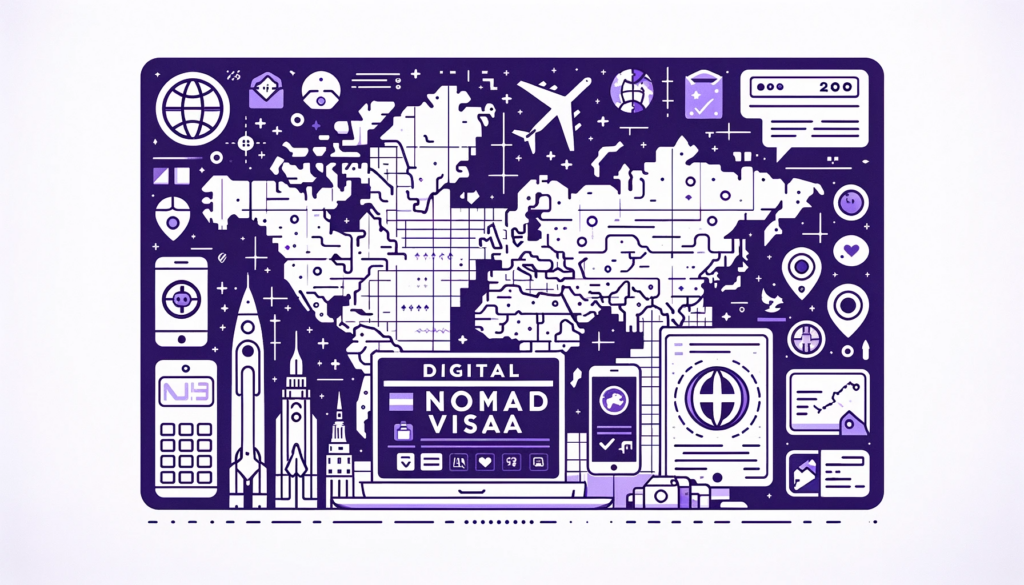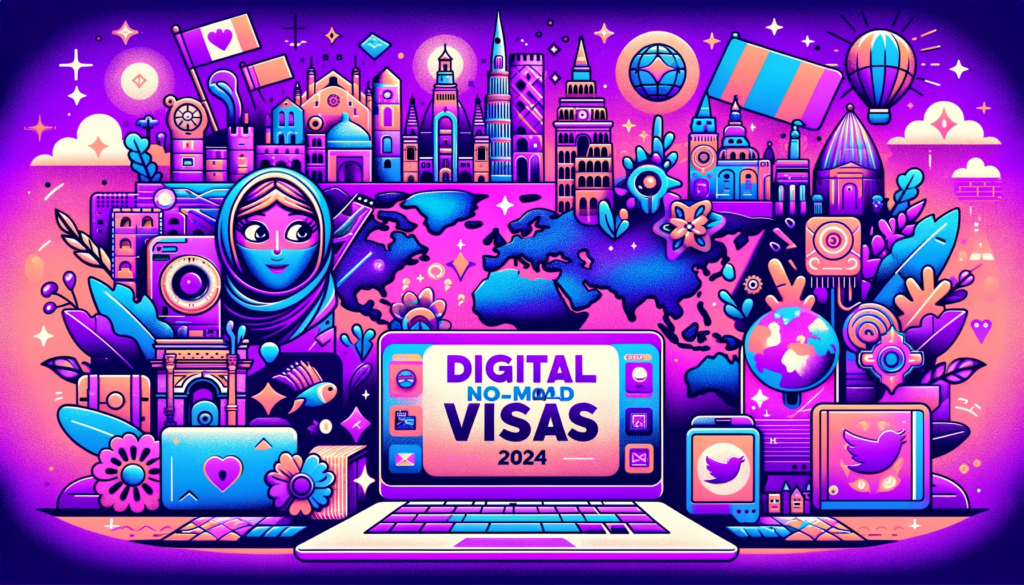As we step into a new year, the opportunities for digital nomads continue to evolve with more countries embracing this growing trend.
This guide will explore the latest and most popular digital nomad visas, providing essential information to help you choose your next remote work destination. Whether you’re a seasoned digital nomad or just starting out, this comprehensive guide is tailored to keep you informed and ready for new adventures.

So, what’s new with digital nomad visas in 2024?
1. Colombia’s Digital Nomad Visa
- Overview and eligibility requirements
- Application process and duration of stay
- Key attractions for digital nomads in Colombia
Who is Eligibility Requirements:
- Valid Passport: Must be valid for at least six months when applying.
- Remote Work: Applicants must be employees, freelancers, or business owners operating outside of Colombia.
- Income Requirement: A minimum income of $900/month.
- International Health Insurance: Coverage must include accidents, maternity, sickness, death, repatriation, and disabilities.
- Letter of Employment: Written in English or Spanish, confirming remote work status.
- Visa Entry Requirements: Applicants should not require a separate entry or tourist visa to enter Colombia.
Application Process:
- Gather Documents: Including a passport copy, color passport-size photo, recent bank statements, proof of remote work, motivational letter, proof of Colombian health insurance, and documentation for dependents if applicable.
- Online Application: Submit through the Ministry of Foreign Affairs’ online portal. The visa is categorized as a visitor visa or V visa.
- Application Fee: A fee of $52 USD is payable online.
- Approval Wait Time: Approximately 30 days.
- Visa Fee Payment: Upon approval, pay a visa fee between $170 and $230 USD. The visa is then electronically delivered within ten days.
Duration of Stay:
- Length of Visa: The Colombia digital nomad visa allows remote workers to live in the country for up to two years, a notable extension from the standard 180-day limit for most visitors.
Key Attractions for Digital Nomads in Colombia:
- Popular Cities: Medellin, known as the City of Eternal Spring, and Bogota are top destinations.
- Affordable Living: Colombia offers an affordable cost of living, which is appealing to digital nomads.
- Vibrant Culture and Cuisine: The country is known for its delicious cuisine and colorful culture.
- Coworking Spaces: Numerous coworking spaces and cafes with free Wi-Fi are available.
- Tech Startup Hub: Colombia is emerging as a hub for tech startups, providing networking and business opportunities for entrepreneurs.
This detailed breakdown of Colombia’s Digital Nomad Visa provides a comprehensive view of what remote workers can expect when considering Colombia as their next destination.
2. Portugal’s Temporary Stay Visa for Remote Workers
- Features of the visa and who can apply
- How to apply and necessary documentation
- Living in Portugal as a digital nomad
Features of the Visa:
- Type of Visa: The Portugal Digital Nomad Visa, also known as the D8, is a residency visa for non-EU/EEA and non-Swiss citizens.
- Two Variants: There are two types of digital nomad visas offered by Portugal: the long-term residency visa, which is valid for four months and needs to be converted to a residence permit, and the temporary stay visa, which is valid for one year and can be renewed but does not lead to a residence permit.
- Path to Citizenship: The visa offers a path to Portuguese/EU citizenship after five years of residency, subject to meeting certain requirements like passing the CIPLE language exam at the A2 level.
- Work Permission: It allows the holder to work in Portugal once they have their residence permit.
- Visa-Free Travel: The visa opens up visa-free travel across Europe, particularly beneficial for those who previously needed a Schengen visa.
- Tax Benefits: Access to certain tax benefits via Portugal’s NHR program (subject to changes).
Who Can Apply:
- Age Requirement: Applicants must be over 18 years old.
- Citizenship: Non-EU/EEA and non-Swiss citizens are eligible.
- Employment Status: Must work fully remotely for a non-Portuguese company or be a freelancer for clients outside of Portugal.
- Income Requirement: A total monthly income of at least €3,040 (or its equivalent in other currencies).
- Proof of Accommodation: Must show proof of at least one year of accommodation in Portugal already arranged, such as a lease registered with the tax authority.
Application Process and Necessary Documentation:
- Income and Savings Proof: Applicants need to prove a monthly income of at least €3,040 and savings of at least €36,480.
- Required Documents: A valid passport copy, two passport-sized photos, an employment contract copy or freelancer agreements, bank statements, proof of a clean criminal record, proof of accommodation, a letter of intention, and proof of an active private health insurance policy covering the whole Schengen zone for at least six months.
Living in Portugal as a Digital Nomad:
- Internet Infrastructure: Portugal offers some of Europe’s fastest Internet speeds, ideal for remote work.
- Diverse Destinations: From the lively city of Lisbon to the tropical island of Madeira, Portugal offers a variety of beautiful destinations.
- Digital Nomad Friendly: The country has a good infrastructure for digital nomads, including laptop-friendly cafes, co-working spaces, co-living spaces, and networking events for entrepreneurs.
This comprehensive overview of Portugal’s Temporary Stay Visa for remote workers outlines the key features, eligibility criteria, application process, and the benefits of living in Portugal as a digital nomad. Read this if you want to work in Portugal for a UK-based company!
3. Estonia’s Digital Nomad Visa
- Unique aspects of Estonia’s digital nomad visa
- Steps for application and required qualifications
- Experiencing Estonia’s digital environment
Unique Aspects of Estonia’s Digital Nomad Visa:
- Types of Visas: Estonia offers two types of Digital Nomad Visas (DNVs): Type C (short-stay) allowing up to 90 days within 180 days, and Type D (long-stay) allowing up to 365 days with the possibility of renewal for two consecutive years.
- Work Flexibility: The visa caters to those who can work independently from any location with an active foreign employer contract.
- Minimum Income Requirement: A minimum monthly income of €3,504 (gross of tax) is required.
Steps for Application and Required Qualifications:
- Eligibility Criteria: Applicants must be at least 18 years old, work remotely for a non-Estonian company, and prove their financial stability.
- Document Checklist: Includes a valid passport, proof of financial means, employment status documents, and proof of valid health insurance.
- Application Process: Involves setting an appointment and attending an in-person interview at an Estonian Embassy or Consulate, submitting the required documents, and paying an application fee of around €100. The processing time ranges from 15-30 days.

Experiencing Estonia’s Digital Environment:
- Advanced Infrastructure: Estonia is renowned for its digital advancement and offers a high standard of living with free Wi-Fi and a friendly community of digital nomads.
- Work Opportunities: Digital nomads can work as freelancers or run their own companies while residing in Estonia.
- Travel Flexibility: The visa allows travel within the Schengen area for up to 90 days in any 180-day period.
- Extended Stay Benefits: Staying in Estonia for more than 183 days within a year may have tax implications, but it also opens up opportunities for a stable work-life balance and participation in the local economy.
Estonia’s Digital Nomad Visa stands out for its flexibility, allowing digital nomads to experience a unique blend of modern living and rich cultural experiences while maintaining their professional commitments.
4. Bali, Indonesia’s Digital Nomad Visa
- Overview of Bali’s new digital nomad visa
- Eligibility and application guidelines
- Balinese culture and digital nomad community
Overview of Bali’s New Digital Nomad Visa:
Bali is a top destination for digital nomads, offering a unique blend of culture, natural beauty, and a supportive environment for remote work. The Indonesian Government has introduced two main visa options for digital nomads: the B211A visa and the Second Home visa, alongside the already existing tourist visa options.
- B211A Visa:
- Duration: Initially valid for 60 days, extendable twice for 60 days each, totaling 180 days.
- Eligibility: Must have a valid passport, be fully vaccinated against COVID-19, provide proof of sufficient funds, and not work for an Indonesian company or individual.
- Application Process: Involves completing an online application, paying a fee of approximately $130 USD, and waiting for approval within 7 to 14 days. The visa allows entry into Indonesia for 90 days from issuance and can be extended for up to 180 days.
- Second Home Visa:
- Duration: Valid for 5 years, extendable for an additional 5 years.
- Eligibility: Requires a valid passport with 36 months validity, proof of funds in an Indonesian bank account of at least 2 billion IDR (around $130,000 USD), a full, up-to-date CV, and no work in Indonesia.
- Application Process: Submit documentation online, including proof of funds and a CV. The fee is approximately $1,400 USD per person. After approval, which takes around 4 working days, the applicant must enter Indonesia within 90 days and provide proof of funds again.
Balinese Culture and Digital Nomad Community:
Bali offers a rich cultural experience and a vibrant digital nomad community. It is renowned for its beautiful beaches, warm weather, and numerous coworking spaces and cafes tailored to digital nomads. The island life in Bali includes beaches, volcanoes, and a range of activities like surfing and yoga. However, digital nomads should be aware of the absence of public transport and the rainy season from December to April. Bali’s low cost of living, coupled with its natural beauty and cultural richness, makes it an attractive destination for digital nomads. You can try shared housing options in Bali!
Tax Requirements:
- B211A Visa: Typically, digital nomads won’t stay long enough in Indonesia to be considered tax residents. The B211A visa is valid for up to 180 days, which is under the 183-day threshold for tax residency.
- Second Home Visa: Nomads will need to pay taxes after 183 days. The income tax rates in Indonesia range from 5% to 35%, depending on the income bracket.
Both visa options in Bali offer unique opportunities for digital nomads to experience a blend of work and leisure in a culturally rich and naturally beautiful environment.
5. The Czech Republic’s Zivno Visa for Freelancers
- The Czech Republic Zivno Visa explained
- Application process and prerequisites
- Life in the Czech Republic for remote workers
The Zivno Visa Explained:
The Zivno Visa, officially known as “Zivnostenske opravneni”, is a long-term business visa designed for freelancers. It allows them to live in the Czech Republic for six months to a year. This visa stands out because it permits freelancers to work with Czech citizens and companies, unlike many other digital nomad visas. One significant advantage of this visa is the freedom of movement it provides within the 26 Schengen countries in Europe.
Application Process and Prerequisites:
- Eligibility:
- Must be a freelancer with clients.
- Valid passport issued within the last 10 years with 2 blank pages.
- Trade License to perform freelance work in the Czech Republic.
- Proof of accommodation in the Czech Republic.
- Financial proof of at least 124,500 CZK (~$5,644 USD).
- Criminal background check from the country of origin or residence.
- Medical insurance is valid in the Czech Republic.
- Application Steps:
- Obtain a Trade License in the Czech Republic.
- Submit the visa application in person at a Czech Embassy, including necessary documents like passport, proof of funds, Trade License, accommodation proof, criminal background check, and health insurance.
- Attend an immigration interview.
- Await approval, which takes about 90 to 120 days.
- Register with the Foreign Police and obtain an official Trade License upon arrival in the Czech Republic.
Life in the Czech Republic for Remote Workers:
The Czech Republic, especially Prague, has become increasingly popular among digital nomads and expats. The country offers an affordable cost of living compared to other European countries, with an estimated monthly expenditure of around $1,500 USD for a single person living in the city center. English is widely spoken, making it convenient for English-speaking remote workers. The Czech Republic boasts a rich history, vibrant culture, and a growing number of coworking spaces, particularly in Prague. Its central location in Europe also makes it easy to explore other European countries.
Note that freelancers on the Zivno visa are expected to pay local taxes in the Czech Republic. The tax structure can be complex, so it’s advisable to seek assistance from a specialized accountant.
6. Mexico’s Temporary Resident Visa
- Details on Mexico’s visa for remote workers
- Application procedure and duration
- The Mexican lifestyle for digital nomads
Mexico’s Temporary Resident Visa for Digital Nomads
This visa presents an excellent opportunity for digital nomads from South Africa. This visa caters specifically to individuals wishing to work remotely while enjoying the rich cultural tapestry of Mexico.
Details on Mexico’s Visa for Remote Workers:
The Temporary Resident Visa allows digital nomads to reside in Mexico for up to four years. It’s an ideal option for those who earn their income from companies based outside of Mexico. The visa process involves proving financial independence and health insurance coverage.
Application Procedure and Duration:
Applicants must initially visit a Mexican consulate or embassy to start the application process. Required documentation typically includes proof of consistent income from abroad, valid health insurance, and a clean criminal record. The initial visa is granted for one year and can be renewed annually for up to four years. After this period, applicants can apply for permanent residency.
The Mexican Lifestyle for Digital Nomads:
Mexico offers a vibrant lifestyle that combines modern amenities with a rich historical backdrop. Digital nomads can enjoy affordable living, with the cost of living in major cities like Mexico City being significantly lower than in many Western countries. The country boasts diverse landscapes, from stunning beaches to bustling cities, offering a perfect blend of work and leisure. Additionally, Mexico’s time zones align closely with those in the United States, making it convenient for remote work involving US-based clients. Additionally, check out this guide on working remotely in Mexico as a US citizen.
Here is all you need to know about working remotely from Mexico!
7. Thailand’s SMART Visa
- Thailand’s offering for digital nomads
- Eligibility and application steps
- Living and working in Thailand
Thailand’s SMART Visa for Digital Nomads
This Visa program represents a significant draw for digital nomads, offering an innovative approach to long-term stays in the country. This program is particularly appealing to remote workers seeking to immerse themselves in Thailand’s unique culture and lifestyle.
Thailand’s Offering for Digital Nomads:
The SMART Visa targets individuals engaged in technology and innovative industries. It’s ideal for digital nomads working in these sectors, providing them with an opportunity to live and work in Thailand without the need for frequent visa renewals. The program encompasses several categories, including the SMART “T” Visa for talented individuals in tech and the SMART “I” Visa for investors.
Eligibility and Application Steps:
To be eligible, applicants must meet specific criteria, such as having expertise in relevant tech sectors, a clean criminal record, and a health insurance policy. The application process involves submitting a detailed proposal or business plan, proof of income, and relevant professional references. Applicants should apply through the Thai Embassy or Consulate in their home country or the One-Stop Service Center for Visas and Work Permits in Thailand.
Living and Working in Thailand:
Thailand offers an enticing mix of vibrant city life and serene natural landscapes. For digital nomads, the country provides high-speed internet connectivity, a thriving expat community, and a relatively low cost of living. Cities like Bangkok and Chiang Mai are hotspots for remote workers, offering a blend of modern amenities and traditional Thai culture. The country’s cuisine, friendly locals, and tropical climate further enhance the appeal for digital nomads.
A lot of digital nomads are moving to the country – find out the best way to move to Thailand from the US here!
8. Spain’s Non-Lucrative Visa
- Spain’s approach to remote work visas
- How to apply and who qualifies
- Experiencing Spanish culture as a digital nomad
Digital Nomad Visa Spain
Spain’s Non-Lucrative Visa is an attractive option for digital nomads looking to experience life in a culturally rich European country. This visa is designed for individuals who wish to reside in Spain without engaging in any local professional activities.
Spain’s Approach to Remote Work Visas:
The Non-Lucrative Visa is ideal for remote workers who can prove sufficient funds to support themselves without needing to work for a Spanish employer. This visa is especially appealing to digital nomads, retirees, or those with passive income sources. It allows holders to live in Spain while working remotely for companies outside of Spain.

How to Apply and Who Qualifies:
Applicants must demonstrate they have sufficient financial means to sustain themselves without working locally. This typically includes bank statements showing savings or proof of regular income from investments, pensions, or other sources. Additionally, applicants need to provide proof of private health insurance and a clean criminal record. The visa application process begins at the Spanish consulate or embassy in the applicant’s home country.
Experiencing Spanish Culture as a Digital Nomad:
Living in Spain as a digital nomad offers a unique blend of modern living and rich historical heritage. Spain is renowned for its vibrant cities, stunning architecture, and diverse landscapes, from beautiful beaches to rugged mountains. The country’s laid-back lifestyle, coupled with its world-famous cuisine and lively festivals, makes it an ideal location for those seeking a balance between work and cultural immersion. Moreover, Spain’s diverse regions offer a variety of experiences, from the bustling streets of Barcelona to the tranquil beaches of the Costa del Sol. If you want to work remotely in Spain for a UK Company, get some info on it here!
Apply for a REMOTE Job with Support Adventure:
The world of digital nomadism is more accessible than ever in 2024, with countries around the globe offering specialized visas to remote workers. With this guide, you’re equipped to make an informed decision about your next destination. Embrace the freedom and adventure that comes with being a digital nomad!
All that is missing is the financial stability when traveling and a job that can allow it. With Support Adventure, an MSP Staffing Company, you can fill out our open roles of:



0 Comments